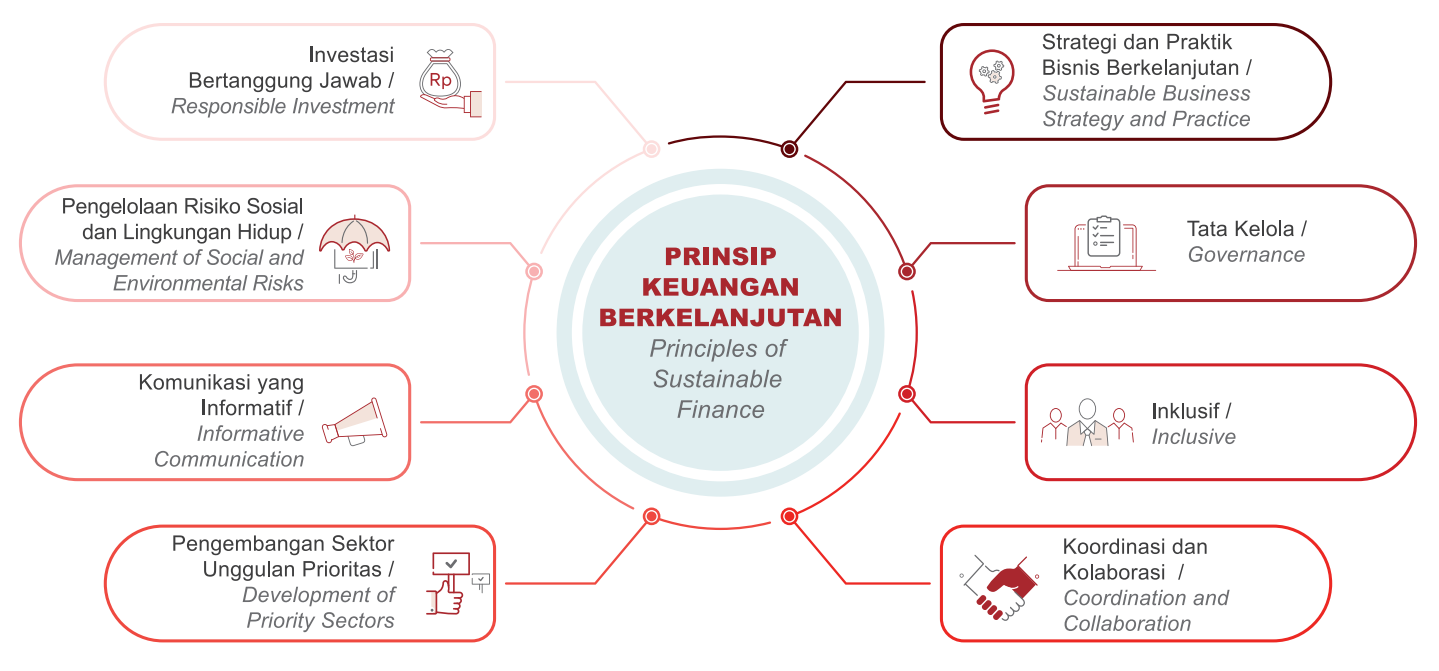About us
Preambule

Sustainable Finance is an ecosystem with comprehensive support in the form of policies, regulations, norms, standards, products, transactions and financial services that harmonize economic, environmental and social interests in financing sustainable activities and financing the transition to sustainable economic growth (Law of the Republic of Indonesia Number 4 of 2023 concerning Development and Strengthening of the Financial Sector). In implementing Sustainable Finance, Indonesia still faces various challenges, including convincing businesses and the public that efforts to generate profits will be better and more lasting if done by considering natural resources and social impacts on society. This is known as the profit, people, planet (3P) principle. Thus, an initiative is needed that can change the mindset of businesses from pursuing short-term profits to long-term prosperity. OJK has started the efforts to overcome these challenges by encouraging the application of Sustainable Finance Principles as stipulated in the Financial Services Authority Regulation Number 51/POJK.03/2017 concerning the Implementation of Sustainable Finance for Financial Services Institutions, Issuers, and Public Companies. The Journey of sustainable finance policy development that has been carried out by OJK as follows.
OJK Sustainable Financial Timeline Journey
Desember 2014
Sustainable Finance Roadmap Phase I Issuance
The Sustainable Finance Roadmap Phase I contains an explanation of the sustainable finance program work plan for the financial services industry under the authority of OJK, namely Banking, Capital Markets and Non-Bank Financial Industry (IKNB).
Desember 2016
Development of Sustainable Finance Information Hub (SFIH)
Development of SFIH as an integrated information channel on the development of sustainable finance.
Juli 2017
POJK Number 51/POJK.03/2017 Issuance
OJK Regulation Number 51/POJK.03/2017 on the Implementation of Sustainable Finance for Financial Services Institutions, Issuers, and Public Companies is an overarching rule that regulates the implementation of Sustainable Finance in Indonesia.
Juli 2017
Bali Center for Sustainable Finance
OJK in collaboration with Udayana University Bali launched the Bali Center For Sustainable Finance as an effort to provide an integrated information and study center on Sustainable Finance.
Desember 2017
POJK Number 60/POJK.04/2017 Issuance
POJK Number 60/POJK.04/2017 concerning the Issuance and Requirements of Green Bonds is a provision that regulates the obligations of issuers in issuing Green Bonds and regulates Environmentally Based Business Activities.
Februari 2018
KDK Number 24/KDK.01/2018 Issuance
KDK Number 24/KDK.01/2018 regulates incentives in the form of a discount on the Green Bond Registration fee to 25% of the original fee.
Oktober 2019
Sustainable Finance First Movers
Indonesia became the First Mover for Sustainable Finance Initiatives in Emerging Countries based on the Country Progress Report by Sustainable Banking Network (SBN).
September 2020
Sustainable Finance Incentives
OJK supports the Acceleration Program for Battery-Based Electric Motor Vehicles (KBL BB) launched by the Government in Presidential Regulation No. 55/2019, by encouraging national banks to participate in achieving the program.
Januari 2021
Sustainable Finance Roadmap Phase II Issuance
The Phase II Roadmap focuses on creating a comprehensive sustainable finance ecosystem, involving all relevant parties and encouraging the development of cooperation with other parties.
Februari 2021
Sustainable Finance Incentives 2021
OJK continues to support the acceleration of battery-based electric motor vehicles launched by the government, by encouraging national banks to participate in achieving the program.
Oktober 2021
Establishment of Sustainable Finance Task Force
OJK established the Sustainable Finance Task Force in Financial Services as an effort to realize the development of a Sustainable Finance Ecosystem, as well as a form of support for OJK's commitment to climate change mitigation and adaptation efforts.
Januari 2022
Indonesia Green Taxonomy Issuance
Indonesia Green Taxonomy is a classification of economic activities that support efforts to protect and manage the environment and mitigate and adapt to climate change.
September 2022
Principles for the Effective Management and Supervision of Climate-related Financial Risks Consultative Paper
Holistic approach in addressing climate-related financial risks to the global banking system and seeks to improve banks' risk management and supervisory practices in this area.
September 2023
POJK Number 14/POJK.04 of 2023 Issuance
Regulations that provide the requirements and procedures for licensing carbon trading through the Carbon Exchange.
September 2023
Launching of Indonesia Carbon Exchange (IDX Carbon)
The Carbon Exchange is a system that regulates Carbon Trading and/or records ownership of Carbon Units in Indonesia.
September 2023
POJK Number 17 of 2023 Issuance
Regulations that provide the implementation of good governance principles in banks in the implementation of business activities.
Oktober 2023
POJK Number 18 of 2023 Issuance
Regulations that provide the issuance and terms of debt securities and Sustainability-Based Sukuk.
Februari 2024
Launching of Indonesia Taxonomy for Sustainable Finance
TKBI was developed by emphasizing the principles of scientific and credible, interoperable and supporting national interests, and inclusive.
Maret 2024
Launching of Climate Risk Management & Scenario Analysis (CRMS) Guidelines
CRMS is an integrated framework covering aspects of governance, strategy, risk management and disclosure to assess the resilience of banks' business models and strategies in the face of climate change.
Sustainable Financial Roadmap
Sustainable Finance Roadmap Phase II
OJK developed the Sustainable Finance Roadmap Phase II (2021 - 2025) to accelerate the implementation of environmental, social and governance principles in Indonesia.Read More
Sustainable Finance Task Force
The Phase II Roadmap focuses on creating a comprehensive sustainable finance ecosystem, involving all relevant parties and encouraging the development of cooperation with other parties.

